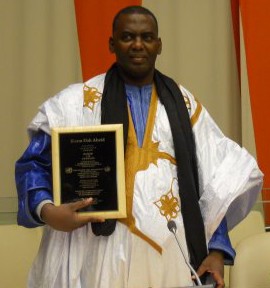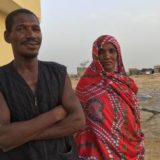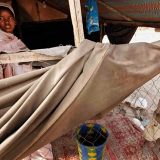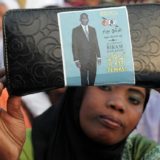Biram Dah Abeid Speaks to BBC: Slavery in Mauritania Still Very Much A Live Issue (UNPO)
This podcast is courtesy of BBC World Service – Outlook
I lived in a family of former slaves. My mother gave birth not in a hospital, but with the help of the women of the village. My family made an income off of farming and animals.
From my youngest age, I lived among slaves and they were part in the entire environment and in every house, all lives were infected by it. Among the ruling class, manual work is considered degrading and slaves are seen as a requirement, which you are able to call upon 24/7 whenever you need them. They are at your disposal at every hour of the day.
In the village there was a young slave, quite big and strong that always used to go hungry. He was unfed and badly dressed, working day and night for those who were his masters. One day my mother fed and clothed him, and he fell asleep while in our home. Then a small man came over and woke the slave, hitting him with a stick. I saw that and thought “why doesn’t he rebel and fight back?” After he left, my mother told me that “he was in chains, religious chains and he has been taught that if you fight back against your masters, you will go straight to hell”.
My father was the one most affected by it. Though he was officially liberated as a foetus, his mother and brothers were still enslaved. He lived in a state of semi-freedom, like all emancipated slaves, eventually marrying a slave girl, and had planned to leave Mauritania to go to Senegal, which was a freer country, an El-Dorado in the 1940’s. But the masters of his wife refused, and the reason they gave was that she was their property. In addition, the slavery code says that the husband of an enslaved woman isn’t really a husband, just a genitor, so he would not have any rights over the status of his children. Embittered he left his family behind and emigrated to Senegal, wanting to marry another woman who was not a slave to build a new normal life. That woman would be my mother, and I and my brothers and sisters were born free.
My father fought his entire life, he helped slaves rebel, and he helped some of them to break free and fought against the pro-slavery groups. And he told me, “I’m sending you to school so you can fight slavery intellectually. I want you to read two kinds of books, 1) the same religious books when I was young that were used by the masters to justify slavery and 2) the books of the white men who didn’t want to help and didn’t want to interfere with the local customs. I fought slavery physically but it didn’t have much effect. The real change will come through an intellectual fight.” I had to promise him and swore to him that I would fight without ever compromising including against slavery and those that promote slavery.
The family returned to Mauritania and Biram (Still a schoolboy) lived up to the promise he made to his father. He would argue with teachers and fellow pupils about slavery and started distributing pamphlets. It made him very unpopular.
I was hated by everyone. I was hated by the slave masters, but also by the slave community, because the slave masters would manipulate their opinion against me using Islam. I wanted to debate with them rationally but they knew they would lose, instead they would tell people that I was against Islam, an enemy of Islam, that I would read Jewish books and was a friend of the Jews and an enemy of all Muslims and the Muslim community.
It didn’t deter him, as Biram read law at university and became a clerk in the Mauritanian legal system, all the while campaigning against slavery. He founded his own organisation, the Initiative for the Resurgence of the Abolitionist movement, and it was soon at the forefront of the anti-slavery fight. Protesting in front of the Justice Ministry and organising marches all over Mauritania.
We created a popular movement, and organised the 1st popular demonstration against slavery, though it was severely repressed. I have been to jail several times, me myself I’ve only come out of jail a couple of months ago. The state constantly harasses us legally, but it is a movement that keeps growing and we have freed thousands of slaves, but it’s a risky activity. There have been many murder attempts against me. I still live amongst slaves, I help them, I free them, I fight in court for them, I give them shelter in my house, I take in their children and send them to school
Under international pressure, a new law had come into force in 2007 making it possible to convict slave owners and other groups that try to enforce the law through protest and publicity. 3 years later, things came to a head.
This all starts with a woman in the pro-slavery community, when she married she received a present of 2 little slave girls, as is the custom of the ruling class in the Arab-Berber community. We found the girls and went over there with the police, who established that they were 2 slave girls, but the police tried to hide it and denied that they were slaves. That’s when we decided to demonstrate peacefully in front of the police station. The police were not used to that and decided to severely crack down on the demonstration and we were all sent to jail.
Biram was charged with fighting a police officer and imprisoned for three months. But for the 1st time the slave-owner was also convicted with a much shorter sentence of 9 days. On his release, he met many newly freed slaves who told him horrific stories
I have collected thousands of stories and they’re all more horrible than the other. A woman had been pregnant and when she gave birth, the masters took away the baby, brought an oven with burning coal, putting the baby on the coal. The baby screamed and died immediately. The masters said that if she kept the baby alive, she would not be doing her work properly.
In 2012, Biram decided on a protest that caused huge controversy and led to his having fatwas against him.
As part of my thinking to help deconstruct intellectually the false interpretation of Islam that is a religion of egality, justice and of peace, on the 27th of April 2012 I decided on that day as a Muslim that as a group of 600-800 friends after Friday prayers pray publicly in a public square. I decided to burn publicly copies of the black code, the slavery code, which the ruling class uses as the only real interpretation of Islam and is the prime source of law in Mauritania. President Abdelaziz sent an army to arrest me, dozens of vehicles and an entire group of security forces. I thought I would die, but other people died before me because of their idea and fight for justice. But just before being arrested, a friend said if I died that the slavers would not last very long, as the slaves and the former slaves will rise up. We represent 50% of the people in this country, and if I survive then it will be a victory from which power will never quite recover.
A few months later, he was released.
It felt like victory and the burning was seen as a trigger to ignite liberation for all the salves and former slaves.
The book burning had received international attention and Biram was awarded the United Nations prize in the field of human rights and ran for president in the 2014 election, coming 2nd and went back to jail, charged with disturbing public order and belonging to an unrecognised organisation. Serving 18 months and was released in May this year. Biram travelled to the United States and received an award from the US government. While he was away 13 activists were detained and are awaiting trial. Biram is now back in the country.
For my life and lives of my companions, I’m afraid. Maybe I’ll go to prison, maybe not, I don’t know exactly what will happen and I don’t know what the government has planned for me. All I know is that it’s not going to be very good.
Photo Courtesy of BiramDahAbeid.org





